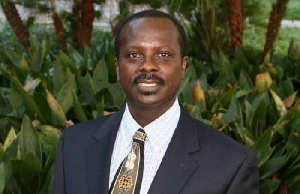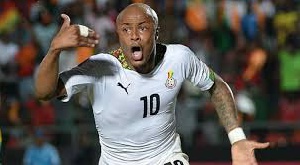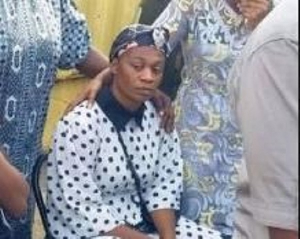- Home - News
- TWI News | TV
- Polls
- Year In Review
- News Archive
- Crime & Punishment
- Politics
- Regional
- Editorial
- Health
- Ghanaians Abroad
- Tabloid
- Africa
- Religion
- Election 2020
- Coronavirus
- News Videos | TV
- Photo Archives
- News Headlines
- Press Release
General News of Wednesday, 15 May 2024
Source: rainbowradioonline.com
CJ should have no business deciding who constitutes a panel – Prof. Kwaku Azar
Prof. Kwaku Asare, a private legal practitioner and accounting professor, also known as Kwaku Azar, has proposed a new procedure for appointing judges to preside over Supreme Court cases.
He claims that while the constitution specifies how many judges can preside over cases, it does not address how these judges are chosen.
This responsibility, he explains, has been left in the hands of the Chief Justice, which he finds problematic.
In an opinion piece, the professor highlights concerns raised by several others who believe that an opportunistic Chief Justice could predetermine the outcome of a case by empaneling Justices with known views on the law.
According to him, these are not only theoretical or conceptual issues, recalling how former Supreme Court Justice Atuguba publicly revealed that he was barred from sitting in court hearings for six months.
To address these concerns, he proposes that the creation and scheduling of the panels be assigned to the court’s registrar or registry. "Furthermore, the registry should be mandated to use a verifiable random system to choose court panels, utilizing court practice management software," he added.
He also suggests that a minimum of nine justices sit on all constitutional cases. "This will avoid the problem of panels reaching different decisions on the same constitutional issue, as has happened in Osei Boateng and other cases," he noted.
In his view, the Chief Justice should have no business deciding who constitutes a panel.
"For the avoidance of doubt, the Chief Justice or other justices should have no role in forming court panels. It must be understood that in his role as a judge, the Chief Justice is primus inter pares.
"He has one vote on a panel. He has no power to freeze other members or to decide who should and should not hear a case," he stressed.
Read his full opinion below:
1. The Supreme Court consists of the Chief Justice and not less than nine other Justices of the Supreme Court.
2. The Constitution stipulates that any five members of the Supreme Court can sit on a case. The minimum number of justices to review a case is seven.
3. If there is no limit on the number of Supreme Court justices but any five of them can decide a case, then who or what determines the five that can sit on a particular case?
4. This is not a trivial problem because it can readily be seen that the resolution of a case turns on the justices who are selected to sit on a case.
5. Unfortunately, the Constitution does not tell us how the panel of five is to be chosen.
6. Historically, the Chief Justice has been responsible for choosing the panel. This practice may have evolved from NLCD 84 and Akuffo-Addo v. Quarshie-Idun [1968].
7. Of course, even though the Chief Justice is assumed to have high integrity and is presumably thoroughly vetted by parliament, it is also the case that he is human and therefore subject to well-known human frailties.
8. Many have therefore raised questions about this practice and have pointed out that an opportunistic Chief Justice could predetermine the outcome of a case by empaneling Justices of known views on the law.
9. These are not merely theoretical or conceptual problems. Justice Atuguba has publicly stated that he was frozen out of sitting in court cases for six months.
10. These questions have exercised the mind of some Chief Justices, with Chief Justice Wiredu addressing it with a practice directive that all but two of the justices will sit in constitutional cases. The two are set aside in case there is the need for a review.
11. The questions persist, and it’s time for the Rules of Court Committee to address them. GOGO proposes that the creation and scheduling of the panels be assigned to the court’s registrar or registry. Further, the registry should be mandated to use a verifiable random system to choose court panels, using court practice management software.
12. GOGO also suggests that a minimum of nine justices sit on all constitutional cases. This will avoid the problem of panels reaching different decisions on the same constitutional issue, as has happened in Osei Boateng and other cases.
13. For the avoidance of doubt, the Chief Justice or other justices should have no role in forming court panels. It must be understood that in his role as a judge, the Chief Justice is primus inter pares. He has one vote on a panel. He has no power to freeze other members or to decide who should and should not hear a case.
14. Whatever questions exist or solutions that are offered for the empaneling problem, there must be no doubt that nobody can reshuffle a constituted panel, without cause, once it has been announced.
15. Any attempts to interfere with the composition of an announced panel without cause must be considered as an obstruction of justice or interference with the administration of justice.
16. Justices of the Supreme Court must also be assertive and refuse to be reshuffled without cause.
17. The recent reshuffling of justices in the Opuni and Agongo case raises profound questions about fairness, abuse of power, and justice.
18. GOGO calls for reinstating the status quo by reversing the reshuffle and returning the case to the original panel.
19. GOGO calls for a full explanation of the attempted reshuffle.
20. At a time when trust in the justice delivery system is at an all-time low, GOGO calls for transparency, not arbitrariness.
21. Public confidence will further decline if the public believes that the court system has become a one-person show.
22. #SALL is the cardinal sin of the 8th Parliament.











